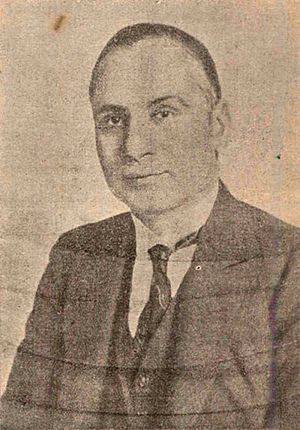Tej Bahadur Sapru facts for kids
Quick facts for kids
Tej Bahadur Sapru
|
|
|---|---|
 |
|
| Born | 8 December 1875 Aligarh, United Provinces of Agra and Oudh, British India
|
| Died | 20 January 1949 (aged 73) |
| Nationality | Indian |
| Alma mater | Dr. Bhimrao Ambedkar University |
Tej Bahadur Sapru (8 December 1875 – 20 January 1949) was an important Indian leader. He was a freedom fighter, a skilled lawyer, and a politician. Sapru played a big part in India's fight for independence from British rule. He even helped create the Indian Constitution. He led the Liberal Party during the time India was ruled by the British.
Contents
Early Life and Education
Tej Bahadur Sapru was born in Aligarh, a city in what was then called the United Provinces. This area is now known as Uttar Pradesh. He came from a Kashmiri Pandit family. His father, Ambika Prasad Sapru, was a landowner.
Sapru studied at Agra College. After his studies, he became a lawyer at the Allahabad High Court. Later, he also served as a dean at the Banaras Hindu University.
Political Journey and Contributions
Sapru was involved in politics for many years. He served in different councils that advised the British government in India. These included the Legislative Council of the United Provinces and the Imperial Legislative Council. From 1920 to 1923, he was in charge of law affairs in the Viceroy's Council.
Sapru and other Indian Liberals worked with the Indian National Congress. This was especially true after Mahatma Gandhi became a leader. Gandhi believed in non-violent protest against British rule. Sapru supported Gandhi's Non-cooperation movement for a time.
In 1923, he was honored with the title of Knight Commander of the Order of the Star of India (KCSI).
Working on India's Constitution
As early as 1927, Sapru started a meeting of different political groups. Their goal was to begin writing the Indian Constitution. In 1928, he helped write the Nehru Committee Report. This report was a very important document for how the Indian Constitution would develop. It was the first time anyone suggested that India's many princely states should join the rest of India as one federal country.
Sapru was first a member of the Indian National Congress. But he later joined the Liberal Party of India. He wanted India to have Swaraj (Self Rule) and supported peaceful protests. However, Sapru believed that Indians should gain more political rights by talking with British leaders. He was a "constitutionalist," meaning he preferred working within the legal system.
Mediating for Peace
Sapru was a respected lawyer and often helped solve problems between different groups. He helped mediate between Mahatma Gandhi and the British Viceroy Lord Irwin. This led to the Gandhi–Irwin Pact, which ended the Salt Satyagraha protest.
He also helped Gandhi and Dr. Bhimrao Ramji Ambedkar reach an agreement. This agreement, called the Poona Pact, solved the issue of separate voting groups for India's "Untouchables" (now known as Dalits).
Sapru was chosen to represent Indian Liberals at the Round Table Conferences in London (1931–1933). These meetings discussed giving more self-rule to Indians. He worked hard to bridge the differences between the British government and the Congress party. In 1934, he became a member of the Privy Council.
World War II and the Sapru Committee Report
When World War II started in 1939, Sapru supported the Viceroy's decision to involve India. This was different from the Congress party, which felt the decision was made without asking Indians.
Sapru was also one of the main lawyers who defended soldiers of the Indian National Army. These soldiers had fought against the British with help from Japan during the war.
In 1944, a committee was formed to suggest ideas for India's future constitution. Sapru was asked to lead this committee. The report they created was called the 'Constitutional Proposals of the Sapru Committee'. It is often known as the Sapru Committee Report.
This report suggested 21 ideas for how India should be governed. It also rejected the idea of dividing India into two separate countries, India and Pakistan. The report also made suggestions for protecting minority groups in a united India. Even though it didn't get much attention at first, the Constituent Assembly of India used it as a reference when writing the Constitution of India.
Family Life
Tej Bahadur Sapru and his wife had five children. They had three sons named Prakash Narain Sapru, Trijugi Narain Sapru, and Anand Narain Sapru. Their daughters were named Jagdambashwari and Bhuvaneshwari. His grandson, Jagdish Narain Sapru, became a successful businessman.
Sir Tej Bahadur Sapru passed away on 20 January 1949 in Allahabad. This was about a year and a half after India gained its independence.
 | Ernest Everett Just |
 | Mary Jackson |
 | Emmett Chappelle |
 | Marie Maynard Daly |

